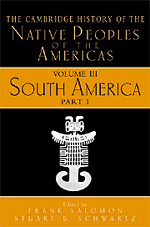Book contents
- Frontmatter
- Contents
- List of Illustrations
- Introduction
- 1 Testimonies: The Making and Reading of Native South American Historical Sources
- 2 Ethnography in South America: The First Two Hundred Years
- 3 The Earliest South American Lifeways
- 4 The Maritime, Highland, Forest Dynamic and the Origins of Complex Culture
- 5 The Evolution of Andean Diversity: Regional Formations (500 B.C.E.–C.E. 600)
- 6 Andean Urbanism and Statecraft (c.E. 550–1450)
- 7 Chiefdoms: The Prevalence and Persistence of “Señoríos Naturales” 1400 to European Conquest
- 8 Archaeology of the Caribbean Region
- 9 Prehistory of the Southern Cone
- 10 The Fourfold Domain: Inka Power and Its Social Foundations
- 11 The Crises and Transformations of Invaded Societies: The Caribbean (1492–1580)
- 12 The Crises and Transformations of Invaded Societies: Andean Area (1500–1580)
- 13 The Crises and Transformations of Invaded Societies: Coastal Brazil in the Sixteenth Century
- Index
13 - The Crises and Transformations of Invaded Societies: Coastal Brazil in the Sixteenth Century
Published online by Cambridge University Press: 28 March 2008
- Frontmatter
- Contents
- List of Illustrations
- Introduction
- 1 Testimonies: The Making and Reading of Native South American Historical Sources
- 2 Ethnography in South America: The First Two Hundred Years
- 3 The Earliest South American Lifeways
- 4 The Maritime, Highland, Forest Dynamic and the Origins of Complex Culture
- 5 The Evolution of Andean Diversity: Regional Formations (500 B.C.E.–C.E. 600)
- 6 Andean Urbanism and Statecraft (c.E. 550–1450)
- 7 Chiefdoms: The Prevalence and Persistence of “Señoríos Naturales” 1400 to European Conquest
- 8 Archaeology of the Caribbean Region
- 9 Prehistory of the Southern Cone
- 10 The Fourfold Domain: Inka Power and Its Social Foundations
- 11 The Crises and Transformations of Invaded Societies: The Caribbean (1492–1580)
- 12 The Crises and Transformations of Invaded Societies: Andean Area (1500–1580)
- 13 The Crises and Transformations of Invaded Societies: Coastal Brazil in the Sixteenth Century
- Index
Summary
“It is impossible either to enumerate or comprehend the multitude of barbarous heathen that Nature has planted throughout this land of Brazil,” wrote Portuguese chronicler Pero de Magalhaes Gandavo, around 1570. To be sure, the enormous cultural and linguistic diversity of lowland South America presented a stifif challenge to sixteenth-century Portuguese observers, in spite of their considerable experience with the intricate political configurations of coastal Africa, South Asia, and the Far East. Even so, early European writers left relatively abundant, detailed descriptions of coastal populations. Portuguese, French, German, and English chronicles and reports, along with the massive letters and relations penned by Jesuits, constitute a wide array of sources for the reconstruction of indigenous social organization. However, although this material has been central to Brazilian ethnological debates over the development, dispersion, and structure of Tupi culture for much of the twentieth century, it has been all but abandoned by mainstream Brazilian historiography for over a century. Indeed, the historical dimension of indigenous societies and of their relations with the European invaders remains a glaringly neglected facet of the history of Portuguese America.
Although rich in information and detail, the early literature on indigenous Brazil showed some difficulty in discerning territorial divisions, political organization, and religious institutions in terms familiar to the Western experience. Sixteenth-century writers sought to simplify the intricate mosaic of languages and societies by dividing the native population into broad generic groups. Most of the coastal societies, sharing practically identical cultural attributes, came to be called Tupi, and their language the lingua geral da costa (‘common language of the coast’). But the cultural affinity between Tupi societies failed to correspond to any sort of political unity: From the European perspective, the most remarkable characteristic of the Tupi lay precisely in the constant warfare between competing segments. Referring to the Indians of Porto Seguro and Espírito Santo in his important treatise on the peoples of Brazil, Gabriel Soares de Sousa illustrated this apparent paradox: “And even though the Tupinikin and Tupinambá are enemies, between them there is no greater difference in language and customs than that between the residents of Lisbon and those of Beira.”
This portrait of acute and persistent political fragmentation was enhanced further by the presence of a great number of non-Tupi societies interspersed among the Tupi peoples along the coast, occupying vast expanses of the interior of Portuguese America as well.
- Type
- Chapter
- Information
- The Cambridge History of the Native Peoples of the Americas , pp. 973 - 1024Publisher: Cambridge University PressPrint publication year: 1999
- 7
- Cited by



